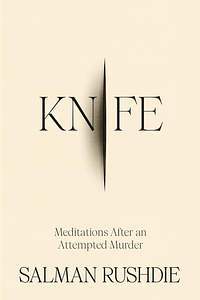Take a photo of a barcode or cover
challenging
emotional
informative
reflective
fast-paced
emotional
inspiring
medium-paced
I've not read much Rushdie. Quichotte, a later novel of his, is pretty much the only full book, plus there have probably been some essays and such from the New York Times. But the thrust of Rushdie's whole life -- principles vs indulgence, speech freedom vs la-la playboy NYC artiste thang, or something -- all reflects back toward me, toward my personal life, in very illiberal liberality I'm kind of feeling I have to try to juggle. So I relate, but it may be kind of reluctant, no offense to him.
This later memoir, Knife, can jump significantly higher than Rushdie's earlier memoir, Joseph Anton. In my opinion! But with all due respect to myself, who cares? Uh. "It is said that Henry James’s last words were 'So it has come at last, the distinguished thing.' Death was coming at me, too, but it didn’t strike me as distinguished. It struck me as anachronistic" (17). Ok? Are you saying you're like Henry James? Huh. (The gall on this fellow! like he has decades and decades of experience on me, perspective, reams of paper, whatever, etc.! Jeez. )
In dealing with liberality (Western secular free-speech, in Rushdie's case; or government benefits, in mine) you deal with it in starkly illiberal ways (anti-religion, disrespect in his case, or lazy no-work cushiness in mine); or even deeper, obscurer, stupider kind of examples (Van Morrison's music-biz poetry stuff just given to crusty revenge-song whines early on). Etc. Reverse chronologically I go, and imho maybe reverse quality-wise too? Oh but years-long Rushdie affair tackled ideologically: big whoop. It was paradoxically deep?
This small little scrap of memoir -- Rushdie's Anton Joseph, a bigger memoir, came years before -- seems more my speed. Knife's a deeper, later, more concise illustration. Its predecessor took its third-person pov very earnestly, while the later one relaxes into more normal first person. Also, just by the by, what's 'Islam' to you, 'freedom'? What's 'being able to write', 'being a writer', 'being among writers'? Arrogant? Seeming / being? Uh.
Uh, to take stock of all the luxurious privilege you got and waste, better zoom up on your "contemporaries" (lol): "There are things that are lost in the past, where we all end up, most of us forgotten" (20). He thought I might relate to him and offered me a book; oh, thanks, guy, I really do. Really! "And so that Chautauqua morning I experienced both the worst and best of human nature, almost simultaneously" (28). But, sorry, I've never been to the city, don't really know what it's like. I don't really know what anything is like.
The whole affair, though, to put it frankly a stupid one and a mean one, maddening so much that it can make everyone just mad, is nevertheless strung with principles better. Like, in a general sense -- "intimacy of strangers. That’s a phrase I’ve sometimes used to express the joyful thing that happens in the act of reading, that happy union of the interior lives of author and reader" (29) or "Something strange has happened to the idea of privacy in our surreal time. Instead of being cherished, it appears to have become, for many people in the West, especially young people, a valueless quality -- actually undesirable" (58). Kids these days. (My mama said there'd be 'kids like this' / 'days like this' / 'kids these days' / etc.)
Or even in a big general sense, a Leach paraphrase Rushdie can mention about Brits -- "The family, with its narrow privacy and tawdry secrets, is the source of all our discontents" (59); but he can pull it back toward himself, like a cape around his shoulders. I like capes, am impressed by them, even when supposedly 'arrogant' people are underneath? To the far more successful private sense -- like, when, post-stabbing, he's linked by phone from his hospital bed transatlantically to his son Zafar, when he reports "I heard him and wiggled my toes" (76). Aww.
And much later, to try another principled metaphor, seeing New York in a better way again -- "Cities’ stories were my story too, and here again was my preferred ocean, this story-sea of concrete and steel in which I had always preferred to swim" (116). To tidy up the small ("vile ignominy… penis begging for mercy" is how he recounts getting a catheter (119)) to the horrifyingly huge ("For the record: there were, to my knowledge, at least six assassination plots against me in the years after the fatwa" (130)) to the small again ("Trousers falling down were funny. Knife attacks were not" is a breezy little gag he tries once (181)). They go high, we go low, so they go high again?
Or I like the very grave, very-unsuccessful attempt once: "I tried to make light of the situation. 'We could imagine that we are rich enough to have personal chauffeurs,' I ventured. 'No,' she said. 'It doesn’t feel like that at all.' 'Or we could think of all the money we’ll be saving on Ubers,' I said. She gave me a look" (245). To be self-efffacing about it all, even in not-successful a light, looks like modesty. Or when you turn it a tiny bit self-congratulation. Or to turn it another little bit a modest self-congratulation? How's that again?
reflective
This book has made me curious about Rushdie’s other work although I’m sure it would be different as fiction rather than a memoir. He comes across as kind of funny in this work which I wouldn’t have expected.
challenging
emotional
reflective
tense
fast-paced
dark
informative
reflective
fast-paced
hopeful
reflective
sad
medium-paced
I have to admit that I've tried to read a few Rushdie books, but there's something about his style that I find lacks interest for me. I became bored with this read.
dark
emotional
hopeful
inspiring
reflective
sad
tense
medium-paced
🎧 So it’s you. Here you are.
Salman Rushdie’s thoughts as he arose to greet his attacker strike just as deep as the knife that attempted to take his life 15 times on August 12, 2022. Even the cover of this book cuts deep with its striking image.
Jill Muenzner recommended the audiobook for this one, as Salman tells his story. I am not familiar with his work - I haven’t read any of his other books (I plan to), but I remember when this happened. It feels personal and unsettling as a Western New Yorker to know this happened at the Chautauqua Institute.
Like me, you don’t need to have read his books to appreciate Salman’s story. He is such a thoughtful writer and speaker. I felt like I was going through his journey with him. Surviving an attempted murder is nothing I ever hope to experience. From the days leading up to the attack, the day of, and long after, I felt honored to be able to listen to Salman talk about it all: the horrific, the annoying, the celebratory, the bittersweet. I highly recommend giving this a read or listen. It seems especially important in a time where the religious beliefs of some cause so much harm to others.
Salman Rushdie’s thoughts as he arose to greet his attacker strike just as deep as the knife that attempted to take his life 15 times on August 12, 2022. Even the cover of this book cuts deep with its striking image.
Jill Muenzner recommended the audiobook for this one, as Salman tells his story. I am not familiar with his work - I haven’t read any of his other books (I plan to), but I remember when this happened. It feels personal and unsettling as a Western New Yorker to know this happened at the Chautauqua Institute.
Like me, you don’t need to have read his books to appreciate Salman’s story. He is such a thoughtful writer and speaker. I felt like I was going through his journey with him. Surviving an attempted murder is nothing I ever hope to experience. From the days leading up to the attack, the day of, and long after, I felt honored to be able to listen to Salman talk about it all: the horrific, the annoying, the celebratory, the bittersweet. I highly recommend giving this a read or listen. It seems especially important in a time where the religious beliefs of some cause so much harm to others.
emotional
hopeful
inspiring
reflective
medium-paced




